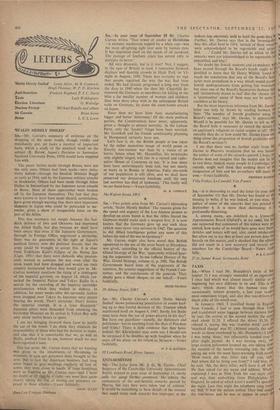'Stalin Merely Smiled' Louis Allen, M. B. Connock, Hugh Thomas,
W. P. D. Kitchen And-Semitism Frederic Raphael, P. S. C. Davis Taxis Lady Waldegrave Election Literature G. Woledge Nuclear Protest Michael Randle and others Sir Gawain Brian Stone
Noise L. E. S. Leese
SIALIN MERELY SMILED' trenchantly put, yet lacks a number of important facts, which a study of the standard work on the subject (R. Butow, Japan's Decision to Surrender, Stanford University Press, 1954) would have supplied him with.
The peace feelers made through Russia were not the only ones. Others had been made—very tenta- tively indeed—through the Swedish Minister Bag0 as early as 1944, and by the Japanese military attache in Stockholm. Others had been made through Allen
Dulles in Switzerland by the Japanese naval attaché
in Berne. Most of these approaches were broken off by the Japanese themselves. The fact that they were known to have been made should, nevertheless, have given enough warning that there were important elements in Japan who could be persuaded to sur- render, given a show of insuperable force on the part of the Allies.
This was necessary not simply because the last- ditch defence of Iwo and Okinawa had impressed the Allied Staffs, but also because we must have been aware that even if the Japanese Government, through its Foreign Office, negotiated a surrender, there was no guarantee, in the light of Japan's political history over the previous decade, that the army could be brought to accept this. It is clear
from Toshikazu Kase's Eclipse of the Rising Sun
(Cape, 1951) that there were diehards who passion- ately wanted to continue the war even after the atom bomb had been dropped and would see their country incinerated before they would give in. Mr. Curran nowhere mentions the rising of a contingent of the imperial garrison, on August 14, which ran- sacked the Imperial Palace and Tokyo Radio in a search for the recording of the imperial surrender proclamation which they wished to destroy. In addition, for some weeks after the surrender leaflets Were dropped over Tokyo by Japanese navy planes bearing the words, 'Don't surrender. Don't believe the imperial rescript. It is a false document.' Japanese pilots were dissuaded from attacking the battleship Missouri on its arrival in Tokyo Bay with only about twelve hours to spare.
I am not bringing forward these facts to justify the use of the bomb. I do think they diminish the responsibility of those who had the decision to make, and also that it is conceivable that we, as well as Stalin, profited from its use, however much we may have regretted it later.
One last point. Mr. Curran states that no warning was given to the inhabitants, of Hiroshima to evacuate, in case our prisoners were brought to the area. But in fact the American bombers had long since begun to give warnings regularly of lists of towns they were about to bomb. If these bombings were as frightful as Mr. Curran saysand I have no doubt at all ths.he Li right—we were then quite clearly taking" the risk of having our prisoners ex- posed to these attacks.—Yours faithfully,
Dun Cow Cottage, Durham
LOUIS 'ALLEN '


































 Previous page
Previous page